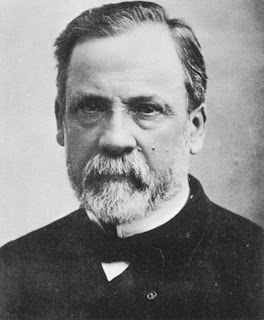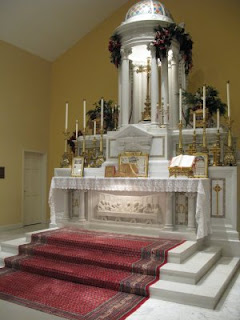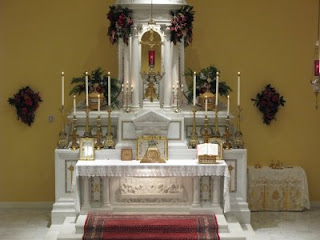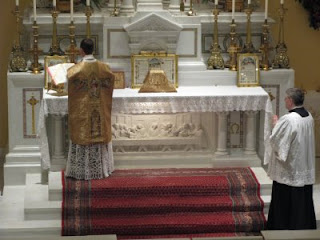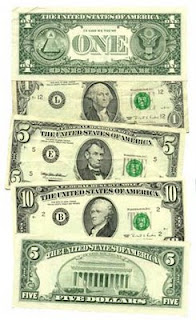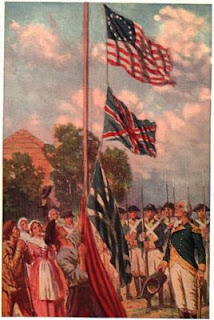Serving Mass the First Time
The letter below was published in the July/August 2004 issue of the Redemptorist paper from Scotland, Catholic.
=======
Reverend Father,
After serving Mass for the very first time this past Candlemas, one of the ladies at the parish asked me what serving was like. In reply I wrote the description which follows; it gave me great joy when my friend replied that it was she had imagined it to be. As a result, I thought that perhaps other readers might like to read my impressions.
I had been preparing to serve my first low Mass when, to my surprise, I was asked to be M.C. - Master of Ceremonies - at Candlemas (five years ago I had never even heard the term); yes, and a High Mass with two servers! My experience in helping to prepare things for the celebration of Mass in the hotel venue we used before we finally got our own chapel in 2001 came in handy now; at least I knew what needed to be done to set up the altar and the credence table, and was able to do that much with barely a pause.
 Chapel of St. Michael's at Michaelmas - Roswell, GA
Chapel of St. Michael's at Michaelmas - Roswell, GAI was not so much nervous as dazed. Even so, the experience of serving was riveting. I suspect that I shall be able to reflect on its significance only years from now, after I have seen how the implications have worked themselves out. All I have now is a first impression. Perhaps I have missed the most crucial points, or been too focused on the tactile elements and not the deeper significance, but to be a Catholic is to have 2,000 years of stories working themselves into everything you see and hear and touch; it is rich and grand, and lovely and familiar too.
For example, everything at the altar seemed immediate and important - almost like I had no depth perception. And yet for all that it was more intimate then being in the pews: I could clearly hear Father's voice; see how he reverently held even the unconsecrated host; touch his vestments as he ascended the steps; smell the coals burning in the thurible. My mouth was dry - perhaps not unlike what the apostles might have experienced in that moment of fear and astonishment when Our Lord said He would be betrayed by one of them.
In spite of stumbling my way through the service, I had a strange sense of ease. Not ease in serving: I had constantly to think about what to do next, and I got several things out of order. Rather, I was aware of a momentary but profound reprieve from what was Out There, beyond the Communion rail; it was as if for a time I was made miraculously indifferent. I was struck by the thought that, for its simplicity and economy, the railing formed a barrier that separated from the world that the world could not begin to comprehend, and would treat with bored and indifferent coldness or hateful cruelty if it could.
That Something is Our Lord, of course, but also the place where Our Lord dwells. The place where He makes His dwelling is, in a way, an extension of Himself; it too is sanctified, by being set aside for His use, at His pleasure, Deo gratias.
While I was serving, I knew everything on the other side of the railing was still there, going on as ever it had, indifferent to our actions, waiting for me to step back into it -- just as the world was, long ago, indifferent to a birth in a poor family in a cave outside Bethlehem, even though what was occurring inside the little cave was greater than all the world.
As the consecration I could clearly hear Father's whisper: Hoc est enim Corpus Meum; his est enim calix Sanguinis Mei. You can hear the whispered words from the pew, but to be right next to the priest at the crucial moment -- perhaps it was what it was like when Dt. John lead his head against Our Lord's breast, and heard the beating of the glorious Sacred Heart.
Our Lord is ruler of all hearts -- and of all the world too, for He made them both. From the angelic chiming of the Sanctus bells to the creak of the tabernacle door: He is in them all by His sustaining power; and under the appearance of common bread and wine He is truly, really, and substantially present thanks to the Mass.
As a recent convert to the Faith (1999), I am frequently amazed at what modern Catholics have given up -- for what? Having myself grown up on the swill-like porridge that the modern world fancies, it astounds me that anyone would willingly surrender his Catholic birthright for such poor fare. And I do not mean merely the externals: the true and good and beautiful realities that the Mass points us to are denied or denigrated outside the Church as a matter of course.


